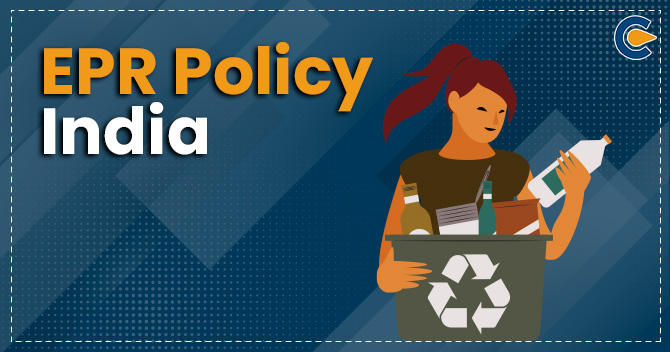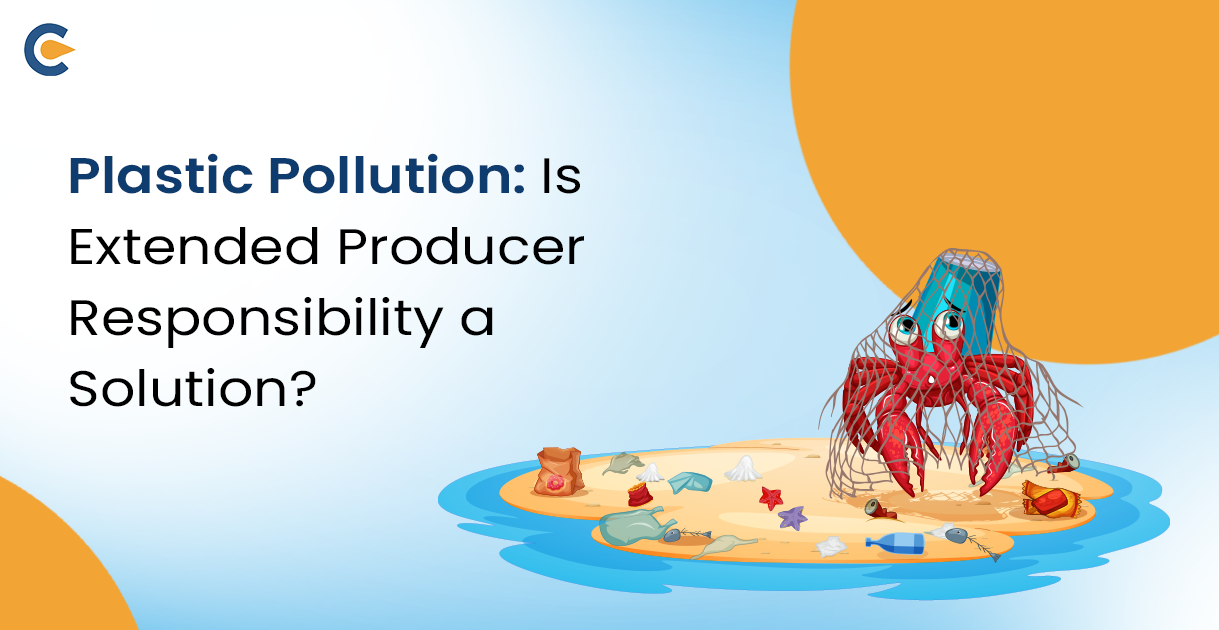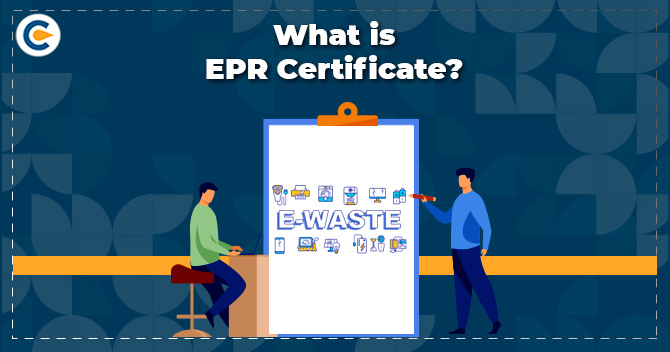The Extended Producer Responsibility (EPR) is the responsibility of Producers (including Brand owners and importers) to have environmentally sound management of their products until the end of their lives. It is a step toward sustainable management of waste. The Indian Government has issued EPR Policy for waste management.
Extended Producer Responsibility (EPR)
Extended Producer Responsibility is defined as an approach where a producer’s responsibility for a product is extended to the post customer stage of such product’s life cycle. EPR Policy India is mainly focusing on these two points:
- Shifting of responsibility towards the producer from the municipalities.
- The incentives the producers are taking into consideration while designing the products.
EPR policy India is targeting the whole product chain, which includes the environmental characteristics of the product and the production processes of such product. EPR policy India is pushing the producers to design the product in such a way that they shall not have a negative effect on the environment.
Now the responsibility has been extended to the producers in such a way that they have to take responsibility for the management of disposal of their products, such responsibility of disposal can be physical, fiscal or a combination of both.
The shift of responsibility by the EPR Policy India includes economic, social and environmental factors. The economic shift is that now the cost of disposal has been shifted from the Government to the producer of such product. For environmental shift, the products designed by the producers are recyclable and use fewer toxic materials in the products. The products now designed are environmentally friendly, using more recycled materials or recyclable materials.
EPR Policy India
EPR Policy in India is an initiative to bring all the producers/brand owners; waste generators; manufacturers; waste management companies or start-ups; Pollution Control Board; Recyclers; etc., to act on wastes by making sure the collection, processing and sustainable disposal to bring in the rules and regulations set by the Government for waste management. It is an approach to sustainably handling the waste by extending the responsibilities of the producer to post customer stage of their product’s life.
EPR Policy India focuses on Plastic waste and e-waste. The Plastic and E-waste Management Rules of 2016 have given the complete guidelines to be followed for a sustainable approach to waste management through EPR.
EPR Policy for Plastic Waste Management
The Ministry of Environment and Forest & Climate Change has periodically notified various rules with respect to plastic waste management. The most recent one is Plastic Waste Management Rules, 2016, which emphasizes on Polluters Pay Principle under the mandate of EPR. The EPR policy in India aims at the sustainable end of life of a product. It has shifted the burden of waste management and sustainable use of life disposal from the municipalities and taxpayers to the producers or manufacturers of such products. EPR Policy also encourages the producers of plastic to design for recycling so that it would result in less spending of time on end-of-life waste management.
The EPR Policy under the Plastic Waste Management Rules gives a detailed understanding of EPR implementation. These EPR policies are strictly aligned with the provisions of Plastic Waste Management Rules, 2016.
The objectives of EPR Policy India under the Plastic Waste Management Rules are as follows:
- To help stakeholders understand the EPR under these Rules, 2016.
- To help stakeholders to identify the best suitable EPR Model
- To assist PIBO (Producer Importer Brand Owners) in framing EPR Action Plan.
- To guide PIBO with Plastic Waste Management Registration and effective EPR implementation process.
- To help EPR monitors or executors identify various opportunities in the Sector of Plastic Waste Management.
- To encourage the states to learn and adopt suitable methodologies.
- To boost the Plastic Waste Management.
EPR Policy for E-waste Management
Electronic Products contain thousands of metals. Some of them are precious, like gold and silver, while others are highly toxic heavy metals like lead, mercury and cadmium. The informal sector in India handles over 95% of all e-waste.
The Central Government has notified the EPR Policy India under the E-waste (Management) Rules, 2016. Some of them are that any change in EPR Plan shall be informed to the Central Pollution Control Board within fifteen days, on which the board will give its decision within sixty days. Another one is that it is the duty of an authorized person to take permission from CPCB to close any collection centre or any other facility which are part of the EPR Plan.
The Guidelines of EPR Policy
There are various guidelines provided under the EPR policy in India which are needed to be followed by the producers, importers and brand owners, etc. Some guiding principles for EPR implementation are:
- EPR is applicable to all producers all over the nation.
- The EPR policy should be Uniform and also brand and geography neutral.
- The producers, importers, and brand owners are free to follow any of the EPR Policies or adopt any of the EPR models simultaneously but except for the fee-based model.
- There will be a single National Registry for registration of all the producers, importers, brand owners, recyclers, etc., to meet individual state data requirements.
- There will be the development of an end-to-end digital transaction platform for EPR, which has all the producers, importers, brand owners, manufacturers etc., and the Plastic Recovery Organizations selected or listed on the policy.
- The Government should own the EPR portal and digital exchange to ensure the protection and confidentiality of members’ data.
- The investments in awareness campaigns and capacity buildings are not part of the EPR Compliances, and they are spent under the CSR budget, except for the fee-based model where the Government uses the funds for the purpose.
- The waste management hierarchy should be maintained, i.e., Reduce, Recycle, Recover and Dispose.
- The EPR Policy India should motivate keeping waste in circulation in the economy at the highest value and promote waste pickers’ working conditions and income.
- The policy should minimize the trading barriers and lower the producer compliance cost for an effective and efficient national market.
- The EPR Policy India for Multi-layered packaging should be higher than the normal for recyclable plastic. The producers, importers and brand owners have to pay a higher cost for EPR of such multi-layered packaging.
- The EPR Policy supports the improvements in working conditions and incomes of informal recyclers.
- EPR allows and provides support for the management of plastics through the system of the Plastic Credit Model.
- The Municipal Corporations[1] are now bearing less responsibility in waste management. Still, they have primary responsibility for the door-to-door collection of segregated waste.
- Private sectors are tapped for leveraging special skills and inputs.
- Recycling targets should cover all the post-consumer packaging wastes. There should be a National EPR target covering all packaging formats such as PET, MLP, Paper cartons, HDPE, LDPE, etc.
- PRO should submit the EPR plan to the State Pollution Control Board. The PROs are then required to discharge the EPR responsibility of their brand owners and importers. They are also required to submit the annual report to the Pollution Control Board.
- The Pollution Control board should make sure that every company involved in waste management is part of the Producer Responsibility Organization or the Packaging Recovery Organisation.
- The EPR Policy aims to achieve increased collection and recycling rates for cost efficiency, value chain optimization, and a well-functioning, transparent waste management ecosystem.
- EPR policy in India, if implemented in the right direction then it can guide the paths toward the transitioning to a circular economy.
- The PROs will grant digital certificates to the manufacturers, producers, importers and brand owners. These digital certificates will have all the information about the procurement of all forms of plastic through their waste management companies engaged.
- EPR Policy will ensure transparency through an open ledger or blockchain technology. It will also be encrypted to avoid tampering.
- EPR Policy India includes setting up a methodology to monitor the effectiveness of the plastic waste recovery system.
- Producers, importers and brand owners register with EPR Portal and make agreements with PRO. The PROs adopt an approach for segregation, collection, recovery and recycling.
- The Municipal bodies also register under EPR policy as a PRO or waste collector.
- Penalties will be imposed on the producers, importers or brand owners for the portion of waste not collected out of the targeted collection, and the money recovered out of penalties will be used for creating plastic waste management infrastructure.
Conclusion
The EPR Policy India re guidelines provided by the Indian Government for the purpose of implementing effective measures for the waste management in our country. It also monitors the companies and the individual involved in the waste management system. It is basically a step towards a sustainable environment and a sustainable way of waste management. The wastes under this policy are required to be recycled in such a manner that they can be reused.
Read our Article:The Importance of EPR – An Overview











